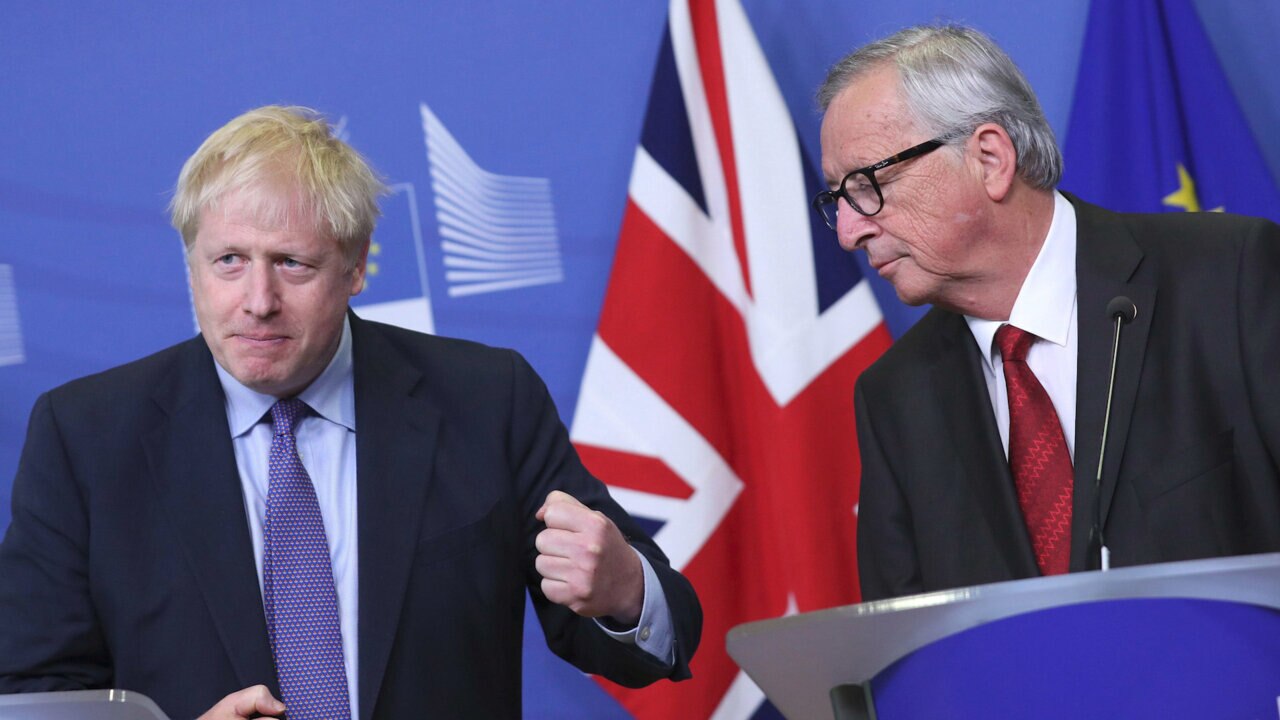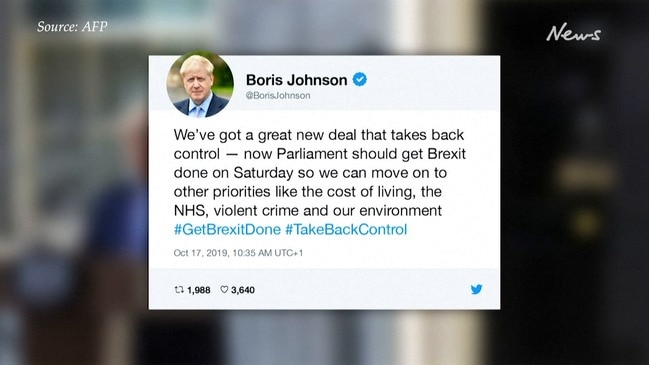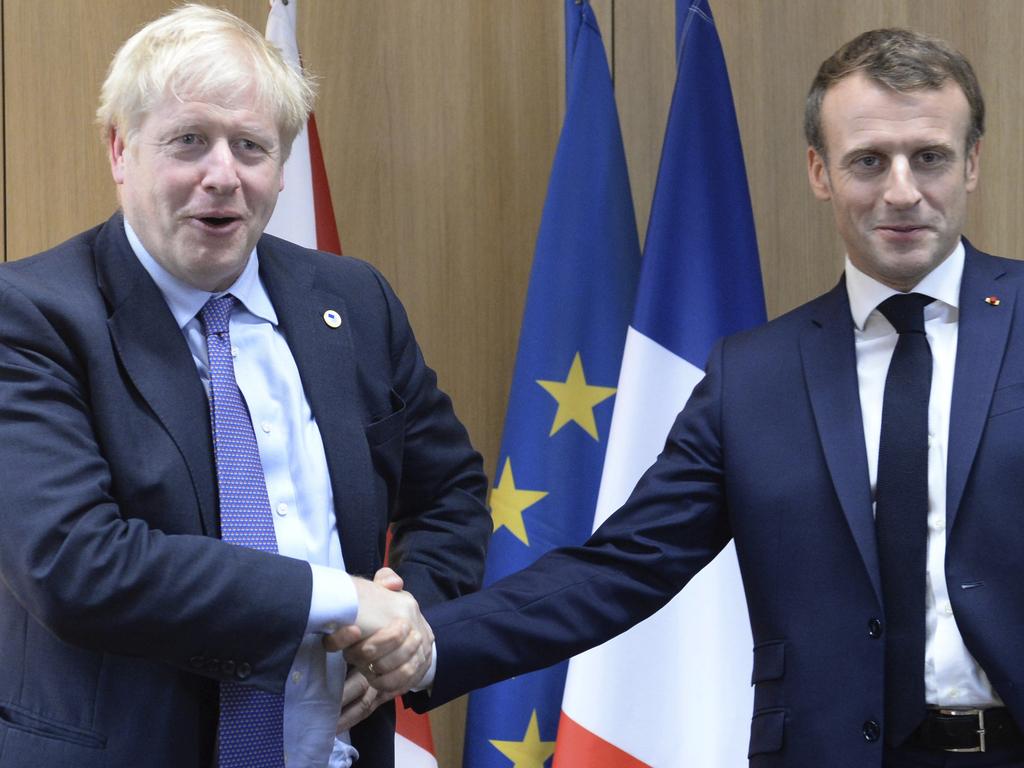Brexit: Boris Johnson switches to salesmanship mode to get deal past MPs
Boris Johnson will spend the next 48 hours desperately selling his deal to MPs.

The European Union has delivered mixed messages about whether they would allow another Brexit extension if the freshly agreed deal with Boris Johnson’s government fails to win parliamentary support on Saturday.
European Commission leader Jean Claude Juncker suggested he was ruling out an extension, in effect supporting the British Prime Minister in getting the deal across the line.
After the long-awaited deal was agreed, Mr Juncker warned: “If we have a deal, we have a deal and there is no need for prolongation’’.
MORE: Explainer: What happens next? | Greg Sheridan - No lipstick on pig of a deal | Explainer — How Boris’ deal differs from May’s | Read all the Brexit news and analysis here
But European Council leader Donald Tusk appeared to hold the door open for an extension, telling reporters: “If there is a request for an extension, I will consult member states on how to react.”
Mr Tusk, an avowed remainer said: “A deal is always better than a no deal”.
Leaders of EU member states did not rule out an extension either and the wording of the EU summit declaration makes no mention of allowing, or alternatively rejecting an extension.
The deal between the UK and EU was struck late on Thursday night (AEDT), with European Commission president Jean-Claude Juncker tweeting: “Where there is a will, there is a deal — we have one! It’s a fair and balanced agreement for the EU and the UK and it is testament to our commitment to find solutions.’’
Mr Johnson tweeted that the two sides had struck a “great new deal that takes back control” and urged British MPs to ratify it in a special session of the House of Commons on Saturday - the first weekend sitting since 1982.
“Now parliament should get Brexit done on Saturday so we can move on to other priorities like the cost of living, the NHS, violent crime and our environment,” he tweeted.
This is our chance to #GetBrexitDone 🇬🇧 pic.twitter.com/BM0MH35ULU
— Boris Johnson (@BorisJohnson) October 17, 2019
If the House of Commons was faced with the binary choice of this new deal or a no-deal Brexit, Mr Johnson’s deal would pass relatively smoothly.
However, the Democratic Unionist Party said it would not support the deal amid concerns about the “consent’’ clause that gives a simple majority in Stormont an option to break away from the UK Customs area to go into the EU in four years’ time.
Other major obstacles include a late push by minor parties to attach an amendment to the deal calling for a second referendum.
Mr Johnson said the new deal removes the undemocratic Irish backstop of the previous deal; but this has not swayed the ten Democratic Unionist Party MPs.
It has also been rejected by Labour, the Liberal Democrats and the Scottish Nationalists. Only if scores of Labour MPs in Brexit seats cross the floor during the vote, will the deal be able to pass.
If the deal is voted down, as Theresa May’s deals were three times, Mr Johnson is obliged under the Benn Act to formally ask the EU for a three month extension.
European leaders were cautious about what will happen next.
But Mr Johnson said in Brussels he was “very confident’’ that his parliamentary colleagues, once they have studied the agreement, will want to vote for it.
“This is our chance in the UK as democrats to get Brexit done and come out on October 3,’’ he said.
“It is a chance to focus on our priorities, like the NHS, police and lifting up eduction across the country and biggest expansion of the living wage.’’
Mr Johnson added that the past three and a half years since the 2016 referendum had been “a long, painful and divisive experience of the UK.
“It hasn’t always been an easy experience for the UK…now is a moment for us to come together, a moment for our parliaments to get this done and to build a new and progressive partnership with the EU’’ he said.
Both the EU chief negotiator Michael Barnier and Mr Tusk spoke about immediate future- relationship talks with the UK starting on November 1, the day after Brexit on October 31.
As a portent to the future tussles that will start as soon as Brexit is delivered, Mr Barnier said a priority of trade talks would be the fishing rights in UK waters, where both Republic of Ireland and Danish fishermen currently obtain the majority of their fish.
Mr Barnier said: “Of course we have to think about exports of UK fishery products to the single market, and that will take place in the negotiations to start if the deal is ratified: to give priority providing for access to EU fishermen to British waters under conditions and access for British processed products access to the EU market. That will have to be considered together and we will consider this a priority.’’
Johnson strikes deal with EU
European Commission president Jean-Claude Juncker tweeted on Thursday night (AEDT): “Where there is a will, there is a deal — we have one! It’s a fair and balanced agreement for the EU and the UK and it is testament to our commitment to find solutions.’’
🇪🇺ðŸ¤ðŸ‡¬ðŸ‡§ Where there is a will, there is a #deal - we have one! It’s a fair and balanced agreement for the EU and the UK and it is testament to our commitment to find solutions. I recommend that #EUCO endorses this deal. pic.twitter.com/7AfKyCZ6k9
— Jean-Claude Juncker (@JunckerEU) October 17, 2019
Mr Johnson tweeted that the two sides had struck a “great new deal that takes back control” and urged British MPs to ratify it in a special session of the House of Commons on Saturday.
“Now parliament should get Brexit done on Saturday so we can move on to other priorities like the cost of living, the NHS, violent crime and our environment.”
We’ve got a great new deal that takes back control — now Parliament should get Brexit done on Saturday so we can move on to other priorities like the cost of living, the NHS, violent crime and our environment #GetBrexitDone #TakeBackControl
— Boris Johnson (@BorisJohnson) October 17, 2019
However, the Democratic Unionist Party said it would not support the deal amid concerns about the “consent’’ clause that gives a simple majority in Stormont an option to break away from the UK Customs area to go into the EU in four years’ time.
READ MORE : There’s no putting lipstick on this pig of a Brexit deal: Greg Sheridan
The DUP believes this would give Sinn Fein the upper hand in future decisions.
Mr Johnson was to ask the EU to issue a clear directive that they would not offer any further Brexit talk extension and the Westminster choice would be between no deal or this deal.
The numbers to pass the deal are tight, even with the support of the DUP’s 10 members, and Mr Johnson will have to embark on the most ambitious sales pitch to turn to rebel Labour MPs as well as sweet-talking the 21 Tory Remainers who previously crossed the floor over the issue and were expelled from the party.

The Liberal Democrats, who described Mr Johnson as “the Emperor with no clothes’’, may add a confirmatory referendum amendment if it appeared the deal was close to passing. It is more likely the opposition parties will trigger a no-confidence vote in the Johnson government and try to install a caretaker prime minister.
Labour has so far indicated it would reject the deal but there could be movement of some MPs if a second Brexit referendum is attached to the Brexit bill.
Labour leader Jeremy Corbyn said it seemed Mr Johnson had negotiated “an even worse deal” than predecessor Theresa May, whose agreement with Brussels was rejected three times.
“These proposals risk triggering a race to the bottom on rights and protections … This sell-out deal won’t bring the country together and should be rejected,” he said. “The best way to get Brexit sorted is to give the people the final say in a public vote.’’
Under the new deal, there will be no hard border on Ireland and Northern Ireland will remain part of Britain and benefit from the free-trade deals London will be able to negotiate with countries outside the EU, such as Australia. However, Northern Ireland will apply EU tariffs to goods passing through its territory.
Chief negotiator Michel Barnier said there would be a transition period until the end of 2020, which was at the request of the British government.
He said the Johnson government had made a clear choice with respect to the future of economic relationships with the EU, and talks about a future trading partnership with the EU would begin on November 1, if the deal were passed.
“The option of creating a single Customs territory between us has been discarded,’’ Mr Barnier said.
The EU leaders’ summit was expected to approve the deal overnight and then the focus will be on Saturday’s emergency sitting of the UK parliament.
Saturday promises to be a critical day in the country’s history, with three possible decisions: accept the deal, perhaps with amendments; reject the deal and call a vote of no confidence — and ultimately a general election; or make Mr Johnson go back to the EU and ask for an extension.
Legally, Mr Johnson has to ask the EU for an extension on Saturday night under the Benn Act if the deal is not passed.
If that extension is not forthcoming, then the legal default is still for Britain to leave the EU on October 31, with or without a deal.





To join the conversation, please log in. Don't have an account? Register
Join the conversation, you are commenting as Logout